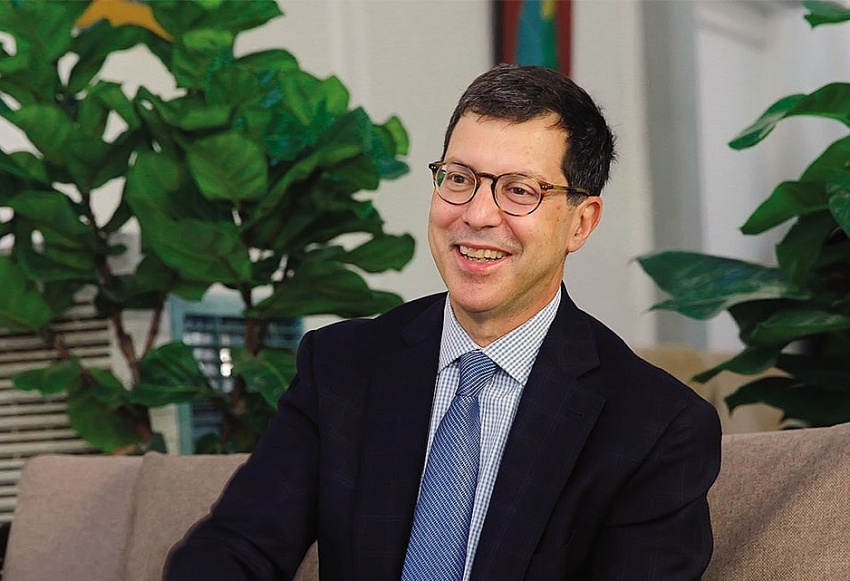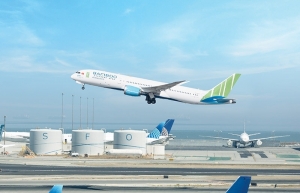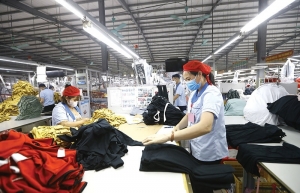Demonstrating the mutual benefits of US-Vietnam ties
What was your first impression of the country’s economic growth upon returning to Vietnam?
 |
| Joe Damond, chief negotiator of the US delegation for the agreement |
The country has changed a lot in the last few decades. The trip from the airport was a lot longer, of course, and the airport itself was much smaller than it is today. Back then, on the streets, there were mostly bicycles and motorbikes and very few cars.
Now, you can tell that there is so much more going on in town: a lot more businesses, restaurants, and coffee shops on every street corner. I think a lot of those changes have to do with the work that we did on the trade agreement.
But one thing that has been consistent is the energy. The city was filled with energy back then in 1995 and it’s certainly still filled with energy today.
What is your assessment of the implementation of the Vietnam-US Bilateral Trade Agreement (BTA) as leverage for investment ties between the two countries?
Trade between the United States and Vietnam has exploded in the last 20 years. The BTA was a very big agreement – close to 130 pages, and there were a lot of requirements for this country. But I think it has been a great success for both countries.
The success for Vietnam is pretty clear: the country has grown tremendously and certainly become much more attractive a place to invest and from which to import products.
For the US, the agreement was about creating a friendship between two countries that have not always been friends and creating some ability to work together. From a strategic perspective, therefore, it has been an important cornerstone for US policies for the last 20 years.
During the negotiation, one of the key phrases was “mutual benefits”. I think we’ve structured it in a way that there have really been mutual benefits for both countries.
What are some of the obstacles and the big prospects that stood out for you, and do you think any upgrades or adjustments to the BTA should be made?
Vietnam has a big trade surplus with the US. But I don’t think that has been bad for the US at all. It’s very unusual to have a trade balance between any two countries. When the US economy is strong, it imports more; and US companies have shifted their sourcing from the US to other Asian countries. While it’s been good for Vietnam, I don’t think it has really hurt America or American businesses, just because there’s a trade deficit. This is something not everybody understands in the US.
I think the United States and Vietnam should go further in developing their trade relationship in terms of market access. The BTA was a very good start as it opened up the US economy to Vietnam and the country has taken a lot of advantages from that. It also opened up the Vietnamese economy to US companies. But it did not go all the way.
I personally think that Vietnam is an important trading partner to the US in the global context and that there’s still more mutual benefit that we could have in going from a bilateral treaty to a full free trade agreement. If there was a political desire in both countries, a free trade agreement is certainly feasible, and it would certainly benefit both sides. But I’m not sure if there’s political willingness right now from both countries.
Several US ambassadors have made the same assessment that both nations need to work together to accelerate US investment in Vietnam. What can be done better to elevate this investment power besides the BTA as a driver?
I think it would benefit this country if it takes some regulatory steps to make it easier for foreign investors. Right now it’s still quite difficult in many sectors, more difficult than it should be, to invest here. It should listen to some US companies that want to invest here, and think about what regulatory system can make investment easier.
They don’t need to wait for a treaty to do that. Because while a bilateral treaty means that Vietnamese companies can invest in the US in exchange for the US to invest here, the US investment market is wide open anyway.
For example, in the pharmaceutical industry, a lot of this has to do with the drug regulatory system in Vietnam, which indirectly affects investment. It takes five years longer in Vietnam to get a drug approved than it does in the US or Europe, so investors are less inclined to invest in drug manufacturing or in research and development.
On top of that, Vietnam has a list of drugs that are reimbursed by the government, which is only updated every three years or so. I understand that the drug regulatory agency has a lot of issues, especially with the recent pandemic. But Vietnam needs to think of this as an investment.
In the last 10-15 years, Japan, South Korea, and China have made huge investments in their drug regulatory agency to make it much smoother to get drugs and clinical trials approved, and that led to big inflows of investment in all three countries. So it really pays off.
With a deep understanding of the trade relationship history, what would you say to American investors coming into this country? And how can Vietnamese businesspeople prepare themselves for the US market?
The main piece of advice is fundamental: the first step to investing in a country is learning its business culture. Things in Vietnam are not done exactly the same way as they are in the US. Some of these aspects are just normal Vietnamese culture, and similarly in the other direction.
I think Vietnam has been very quick to learn about American business culture, or else it would not have been as successful as it is today. But I think a lot of businesses here still really need to understand how competitive and fast-moving the global marketplace is.
So sometimes they need to be bolder in decision making and get rid of the mindset that goes “I’ll see if somebody else does it, and then I can do it if it works for them,” and not wait.
Vietnam has an opportunity to be more of a leader in a lot of areas. Now that technology is changing the business landscape so fast, the longer Vietnam waits to become part of it, the more difficult it becomes. It’s like jumping on a moving train. You need to be bolder and make decisions more quickly.
 | Vietnamese firms winning US hearts The past decades have witnessed important watersheds in Vietnam-US relations and cooperation is expected to further flourish, leveraging the non-stop efforts of Vietnamese businesses like Bamboo Airways to reach out to the US market. |
 | Americans to pump in greener, high-tech capital Investment from the United States is expected to flow more strongly into Vietnam in the fields of digital economy, green energy, and healthcare. |
 | Records ahead in Vietnam-US partnership As former foes, Vietnam and the United States have undergone a long way to normalise diplomatic relations, becoming comprehensive partners in 2013. Under the comprehensive framework established at the visit by former Vietnamese President Truong Tan Sang to the US, trade and economic ties rank second on the list of nine areas of cooperation, only after political and diplomatic relations. |
 | Special summit underlining ASEAN’s importance to US The 2022 US-ASEAN Special Summit will take place in Washington on May 12-13, demonstrating the US’ long-term commitment to countries in the region. Vu Tu Thanh, deputy managing director for the US-ASEAN Business Council, shared with VIR’s Hai Van the highlights of the summit to address pressing problems in the region. |
What the stars mean:
★ Poor ★ ★ Promising ★★★ Good ★★★★ Very good ★★★★★ Exceptional
Related Contents
Latest News
More News
- Hermes joins Long Thanh cargo terminal development (February 04, 2026 | 15:59)
- SCG enhances production and distribution in Vietnam (February 04, 2026 | 08:00)
- UNIVACCO strengthens Asia expansion with Vietnam facility (February 03, 2026 | 08:00)
- Cai Mep Ha Port project wins approval with $1.95bn investment (February 02, 2026 | 16:17)
- Repositioning Vietnam in Asia’s manufacturing race (February 02, 2026 | 16:00)
- Manufacturing growth remains solid in early 2026 (February 02, 2026 | 15:28)
- Navigating venture capital trends across the continent (February 02, 2026 | 14:00)
- Motivations to achieve high growth (February 02, 2026 | 11:00)
- Capacity and regulations among British areas of expertise in IFCs (February 02, 2026 | 09:09)
- Transition underway in German investment across Vietnam (February 02, 2026 | 08:00)

 Tag:
Tag:



















 Mobile Version
Mobile Version